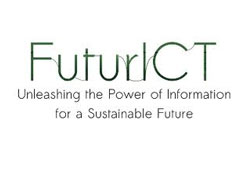IMDEA Networks

Research in social management of data, the “oil of the 21st century”
14 November 2012

FuturICT (www.futurict.eu), scientifically lead by Professor Dirk Helbing (ETHZ) and coordinated by Professor Steven Bishop (UCL) has now submitted an outstanding proposal to the European Commission (EC) on behalf of a consortium of leading EU universities and research organisations, among which is Institute IMDEA Networks.
FuturICT was rated 1st out of the 21 proposals received for the initial stage of the competition which asks for visionary and highly ambitious proposals around Big Science projects that extend over a 10 year period and €1 Billion budget. The report on the FuturICT Pilot Phase was rated “excellent” by the external reviewers. The unifying goal of the FuturICT FET flagship is to integrate the fields of information and communication technologies (ICT), social sciences and complexity science, to develop a new kind of participatory science and technology that will help us to understand, explore and manage the complex, global, socially interactive systems that make up our world today, while at the same time paving the way for a new paradigm of ICT systems that will leverage socio-inspired self-organisation, self-regulation, and collective awareness.
FuturICT capitalizes on three developments: the collection of Big Data and Open Data of techno-socio-economic activities, the availability of previously unseen supercomputing power, and opportunities created by social media and socially interactive technologies. These developments will eventually enable the creation of a “Planetary Nervous System” to measure the state of the world in real-time, a “Living Earth Simulator” to study possible scenarios resulting from causal interdependencies between different processes and systems, and a “Global Participatory Platform” to allow people to solve problems collaboratively that are more complex than any one individual or team can handle. FuturICT will hence develop new science and technology to better manage the opportunities and challenges of our complex, connected world. FuturICT will also create new business opportunities through its new ICT paradigm, characterized by socio-inspired ICT, a co-evolution of ICT with society, platforms for collective awareness, ethical and value-sensitive design, and a whole new information ecosystem fuelled by FuturICT’s Innovation Accelerator, Global Systems Science, and Exploratories which are strongly linked to industry verticals.
Institute IMDEA Networks is among the 7 participants of the Spanish node (FuturICT Spain) within the FuturICT consortium. The Institute will provide its extensive experience on content distribution, network architectures, protocols, communications, green ICT and internet economics, among other fields, as well as skills specific to tackle this project, such as trace and data gathering from social and peer-to-peer-networks, mobile networks and sensor networks. Amongst the key people involved in the research and coordination activities of the FuturICT project, Marco Ajmone Marsan, Full Professor at the Electronics and Telecommunications Department and Chief Researcher at IMDEA Networks- will act as ‘leader’ of the WorkPackage 6.6 on ‘Smart Energy Systems’, where IMDEA Networks will be concentrating its activities. Antonio Fernández Anta, Senior Research at IMDEA Networks, shall coordinate the IMDEA team. Within the overall FuturICT aim to accelerate the scientific cycle that goes from data generation to prediction, the Institute’s research activities will focus on smart energy systems. They will look at future scenarios, devise solutions for future energy networks and energy-efficient ICT (using existing and newly developed tools) and generate insight, understanding and knowledge about the societal, economic, technological and environmental uses of this research, most particularly how its findings may be used in decision making, policy formulation, forecast and crisis management scenarios.
FuturICT is in perfect alignment with Europe’s Vision 2020 with its strong focus on innovation and socio-economic-environmental as well as health challenges. Big Data and Open Data are the “oil of the 21st century” and as Europe is scarce of natural resources, it must build on ideas so the ability to refine them can become Europe’s newest resource. Innovations in this area will offer new opportunities for small and medium-sized businesses, for self-employment and stimulate an age of creativity leading to economic, social and cultural prosperity.
Over the next few weeks the EC will seek review of the six final proposals with a view to funding two FET Flagship projects starting in 2013.
More information:
- Madri+d Noticias (in Spanish)
- FuturICT Spanish node: http://futurict.es
- Video presentation of the project:: http://www.futurict.eu http://player.vimeo.com/video/29779008?autoplay=1
- The Proposal
- IMDEA Networks 3rd Annual Workshop: Internet Science 2011
- We want to build a Planetary Nervous System, Interview to Dirk Helbing,Chair of Sociology, ETH Zürich, Switzerland, and Scientific Coordinator of FuturICT
- Research Centers from Madrid participate in FuturICT.es, the Spanish node of the FuturICT European Project
- Conference Takes A New Approach To Studying The Internet And Social Networking
- International Workshop To Investigate Internet Science And Social Networking



Recent Comments